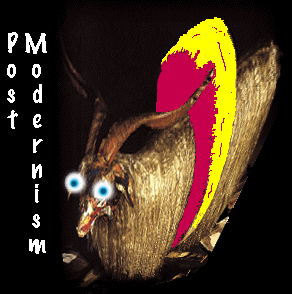

"The last few years have been marked by an inverted millenarianism
in which premonitions of the future, catastrophic or redemptive, have been
replaced by senses of the end of this or that (the end of ideology, art,
or social class; the "crisis" of Leninism, social democracy, or the
welfare state, etc., etc.); taken together, all of these perhaps
constitute what is increasingly called postmodernism. The case for its
existence depends on the hypothesis of some radical break
orcoupure, generally traced back to the end of the 1950s or early
1960s.
As the word itself suggests, this break is most often related to
notions of the waning or extinction of the hundred-year-old modern
movement (or to its ideological or aesthetic repudiation)."
--Frederic Jameson, Postmodernism or, the Cultural Logic of Late
Capitalism
Although the term "postmodernism" is continually undergoing
interrogation and redefinition, one constant that emerges from the
critical discourses surrounding it is a sense that postmodernism involves
a radical rethinking of representational strategies, and with this a
questioning of our underlying assumptions about how "meanings" are
produced. Postmodern narratives are therefore frequently formally
experimental as William Burrough's emblematic "cut-ups" demonstrate,
employing such techniques as fragmentation, intertextuality, and
appropriation to fundamentally alter the way language represents the
"meaning" of texts. Other postmodern narratives are preoccupied with the
intersection of the "past" and contemporaneity, continually asking what's
at stake when representations of previous cultural history are put to work
in various ways as a comment on the present.
Also associated with postmodernism are recent developments in
philosophy and critical theory which have thoroughly dismantled the idea
of a cohesive subject, leaving open the question of the very location of
meaning, along with the possibility of its existence. Theorists such as
Michel Foucault have concerned themselves with tracing how power is bound
up with the ability to dictate meaning in a cultural landscape where signs
and symbols are severed from their ideological moorings.
Links
General
Authors
-
Mark Amerika Homebase
Contains bio, bibliographies, and links to experimental fiction
publications and other sites of related interest.
-
Donald Barthelme Bibliography
Text only bibliography of primary and secondary works. Appears to be
quite exhaustive.
-
William Burroughs Explorer
Hypertext biography of Burroughs.
-
William Burroughs Homepage
Unofficial homepage with novel exerpts, articles, interviews, and links to
other sites.
-
Raymond Carver Web
Bio and links to other Raymond Carver pages.
-
Robert Coover Hypertext
Limited hypertext overview with a list of primary but not critical
sources. Some biographical info, but no links to other pages.
-
Don Delillo Website
Bibliography and list of scholarly articles.
-
Raymond Federman Homepage
Lists published and unpublished works, with links to other Raymond
Federman sites.
-
Jack Kerouac Website
Fantastic site with bios, bibliographies, and links to other pages.
-
Lance Olsen Homepage
Contains bio, bibliographies, novel exerpts, and links to related sites.
-
San Narcisco Community College Thomas Pynchon Homepage
Bio, bibliographies, and links to other Thomas Pynchon pages, organized by
the Pynchonian themes to which they apply.
-
Tom Robbins Fansite
Contains bio, bibliography, reviews, critical
bibliography, and links to other sites.
-
Philip Roth Research Homepage
Friendly, well-organized page with bio, bibliography, and critical
bibliographies.
-
J.D. Salinger Website
Bio and links to other J.D. Salinger Websites.
-
Hunter Thompson Links
Page of links to Hunter Thompson pages.
-
William Vollman Homepage
Bio, bibliography, and links to articles and reviews.
-
Kurt Vonnegut Homepage
Links to bio, bibliography, and other Kurt Vonnegut sites.
-
Kurt Vonnegut Resources
Many Kurt Vonnegut resources and links.
Magazines and Journals
Return to Home.
Return to Genres.



